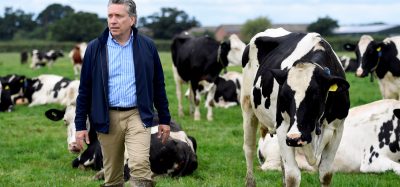UK food system needs wartime-scale reset to protect economy and NHS
Posted: 16 October 2025 | Ben Cornwell | No comments yet
A major report warns the UK food system faces collapse without wartime-scale changes to farming, land use and diets.


The UK food system requires radical reform on a scale not seen since the Second World War, a major new report has warned.
The Roadmap for Resilience: A UK Food Plan for 2050, published this week, says urgent action is needed to safeguard national security, strengthen the economy and reduce pressure on the NHS. Without decisive leadership, it warns, the UK will “lurch from crisis to crisis” driven by climate shocks, food price spikes and declining productivity.
If we act now, we still have time to shape our future, and positively impact national security, national health, economic growth and climate change. Our window to act is narrow though – if we do not, change will be forced on us by crisis.”
The publication comes as global attention refocuses on food system transformation, following the release of the EAT-Lancet Commission’s latest report earlier this month.
Coordinated by the Agri-Food for Net Zero (AFN) Network+, the UK Roadmap calls on government to put food security on a par with energy security and sets out 10 recommendations to guide policy through to 2050.
“Achieving this transformation has the power to deliver a food system where everyone in the UK has access to healthy and sustainable food,” said Professor Neil Ward, Co-lead of the AFN Network+ and professor at the University of East Anglia. “Through these three transformations we can reduce pressure on the NHS and help people lead healthier and more economically active lives. Nature will flourish, emissions will fall and farming will be more resilient and secure for future generations.”
Mounting pressures
The report highlights the escalating costs of inaction. Poor diets already drain an estimated £268 billion from the UK economy each year through healthcare and lost productivity. At the same time, 7.2 million people are living in food-insecure households – an 80 percent increase in just three years.
The UK’s dependence on imports also leaves it vulnerable. 85 percent of fruit and 50 percent of vegetables consumed domestically are brought in from overseas. Meanwhile, emissions from the food system are rising so rapidly that, by the 2040s, food is projected to become the country’s single largest source of greenhouse gases.
“Pressures from climate change, global shocks and poor diets mean significant change to our food system is inevitable over the next 50 years,” Professor Ward said. “However, if we act now, we still have time to shape our future, and positively impact national security, national health, economic growth and climate change. Our window to act is narrow though – if we do not, change will be forced on us by crisis.”
Three transformations
The Roadmap identifies three priority shifts:
- Resilient farming: Supporting farmers to adapt to climate change, diversify and increase fruit, vegetable and wholegrain production.
- Smarter land use: Expanding woodland cover from 14 to at least 20 percent by 2050, restoring peatlands and coordinating land planning regionally.
- Healthier diets: Making nutritious, sustainable food the most accessible and affordable option while reducing reliance on high-emission imports.
Among its recommendations, the report urges government to set dietary change targets, reform agricultural subsidies to reward emissions reductions and biodiversity, and create a National Food System Transformation Committee reporting to the Prime Minister.
“Every year of delay makes transformation harder and more costly,” said Professor Tim Benton, Co-lead of the AFN Network+ and professor at the University of Leeds. “Change is coming to our food system, but how we shape it is our choice to make.”
Backed by science and industry
The plan is the result of three years’ research with input from 150 experts across farming, industry and academia, representing the AFN Network+’s 3,000 members. Funded by UK Research and Innovation (UKRI), the network is led by 11 universities and research institutes.
Professor Charlotte Deane, Executive Chair of UKRI’s Engineering and Physical Sciences Research Council, said the project had “delivered a clear roadmap for change” and left “a legacy of insights which will help shape future land use and food strategy, supporting the UK’s path to net zero.”
Related topics
Environment, Food Security, Health & Nutrition, Regulation & Legislation, Research & development, Supply chain, Sustainability, Trade & Economy, World Food
Related organisations
Agri-Food for Net Zero Network+, UK Research and Innovation (UKRI)









